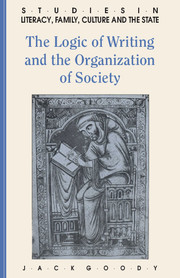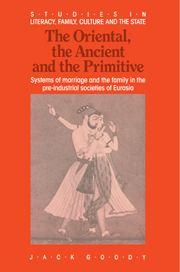2 results in Studies in Literacy, the Family, Culture and the State

The Logic of Writing and the Organization of Society
-
- Published online:
- 05 June 2012
- Print publication:
- 18 December 1986

The Oriental, the Ancient and the Primitive
- Systems of Marriage and the Family in the Pre-Industrial Societies of Eurasia
-
- Published online:
- 09 January 2010
- Print publication:
- 26 January 1990

